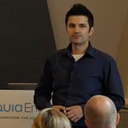It brings to mind the work of Kauffman on complexity and evolution, particularly the idea of adjacent possible. Organizations, like organisms, navigate a complex landscape with peaks and valleys, constantly exploring and adapting in search of higher fitness peaks or, in the business context, superior performance. The idea of strategy as a process of exploration and adaptation aligns with the adaptive walk notion discussed in evolutionary biology. The mapping of the "adjacent possible" can be seen as a form of micro-strategy. It is through such local explorations that organizations discover novel opportunities and potentially more profitable positions on the landscape. The ruggedness of the landscape adds another layer to the challenge as it suggests that the search process is neither smooth nor predictable. It seems that local optima or traps are an inherent feature of such environments, underscoring the need for mechanisms to escape these and discover new possibilities. Your emphasis on optionality as a response to the inherent unpredictability of the environment is well placed. It connects to the concepts of plasticity and flexibility, particularly when it comes to managing uncertainty and change. The notion that managers need to become comfortable with operating with imperfect data and "re-calculating" as new information emerges is important.
It seems we must embrace the absurd and find meaning in the face of an indifferent and often chaotic universe.
